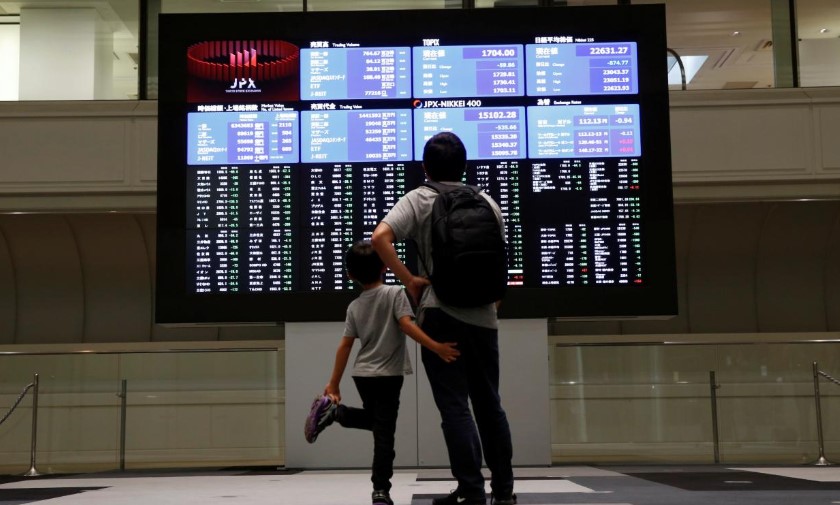
Worries about China’s slowing economy spread across Asian markets on Monday with U.S. stock futures turning down and Chinese shares in the red as concerns about U.S. corporate earnings and global growth continued to hit sentiment.
E-Mini futures for the S&P 500 and Dow minis declined about 0.3 percent each, reversing gains of as much as 0.4 percent earlier in the day. However, spreadbetters pointed to a firm start for Europe with FTSE futures up 0.5 percent.
In Asia, Japan’s Nikkei slipped 0.2 percent, having climbed 1 percent earlier while South Korea’s KOSPI stumbled 1.6 percent. Shanghai’s SSE Composite faltered 2.5 percent.
The losses in Asia were largely led by China’s blue-chip index which tumbled over 3.3 percent following disappointing earnings from the country’s top liquor maker, Kweichow Moutai.
Hong Kong’s Hang Seng index also turned red, leaving MSCI’s broadest index of Asia-Pacific shares outside Japan mostly flat after rising over 0.5 percent earlier in the day.
Chinese data over the weekend underscored worries of a cooling economy as profit growth at its industrial firms slowed for the fifth consecutive month in September as sales of raw materials and manufactured goods ebbed.
Citibank has projected China’s real economic growth to slow to 6.4 percent year-on-year in the fourth quarter “amid trade headwinds and domestic uncertainties,” compared to a 6.8 percent rise at the start of the year.
“As lagging indicators, overall industrial revenue and profit should continue to soften accordingly,” it said.
Wider sentiment in global financial markets has been hit by a range of negative factors from an intensifying China-U.S. trade conflict to worries about U.S. corporate earnings to Italian budget woes as well as Federal Reserve rate increases.
Analysts warn of more volatility after heavy losses across major equity indices left investors with negative returns for the year. Bears are on the rise, with some indices already in official correction territory amid heightened worries over corporate earnings and global growth.
“We’re now over halfway through the U.S. earnings season and while headline growth remains strong, there are a number of trends making market participants nervous,” asset manager Insight Investment wrote in a note to clients.
It cited “explicit commentary” by Caterpillar, 3M and Ford on the adverse effects of U.S. import tariffs and disappointing revenue growth by Amazon and Alphabet among top concerns for investors.
More companies have lagged forecasts this quarter with the beat rate on sales at 44 percent compared with 58 percent last quarter, Insight Investment said.
“European earnings are showing a similar trend, with only 43 percent beating estimates, the lowest in five years. Raw material costs appear to be the main headwind,” it added.
BOLSONARO WINS
In another sign of increased risk aversion, 10-year U.S. Treasuries reversed early gains to be almost flat on the day.
Among emerging markets, Brazilian-linked stocks got a lift from the South American country’s presidential election, which saw the victory of far-right candidate Jair Bolsonaro whose campaign centered on promises to clean up politics and crack down on crime.
Tokyo-listed Brazilian stock exchange traded funds (ETFs) jumped nearly 14 percent to 7-1/2-month highs after Bolsonaro, a former Army captain, propelled to victory.
The safe-haven Japanese yen has benefited from the global sell-off in riskier assets as investors unwound carry trade exposures. It gained 0.6 percent last week and was last at 111.87 per dollar.
Over this week, investors will keep an eye on the Bank of Japan’s monetary policy announcement due Wednesday.
The dollar index rose 0.1 percent to 96.470 after gaining 0.7 percent last week.
The euro hovered near a more than two-month low to hold at $1.1389. Investors heaved a sigh of relief after German Chancellor Angela Merkel’s junior coalition partners gave her conservatives until next year to deliver more policy results.
However, concerns loomed over her future after both parties suffered in a regional election on Sunday.
Sterling held near a two-month trough of $1.2775 ahead of Britain’s annual budget due Monday. Finance Minister Philip Hammond will likely urge his divided Conservative Party to get behind the government’s push for a Brexit deal, or put at risk a long-awaited easing of austerity.
In commodities, oil also reversed early gains tracking Wall Street futures lower. U.S. crude slipped 29 cents to $67.30 per barrel and Brent eased 37 cents to $77.25.
Spot gold was a shade weaker at 1,232.34 an ounce.

